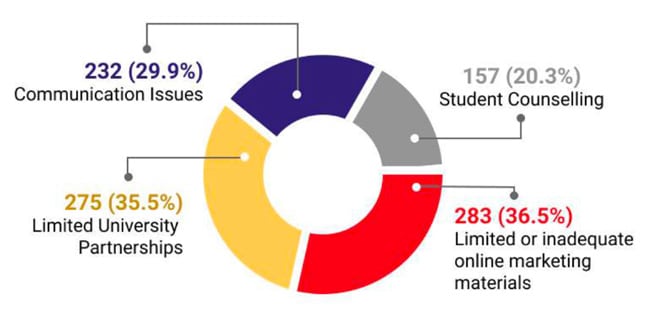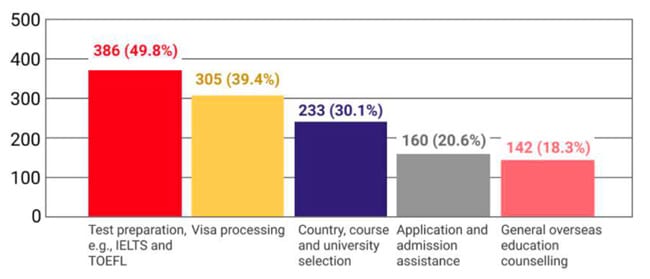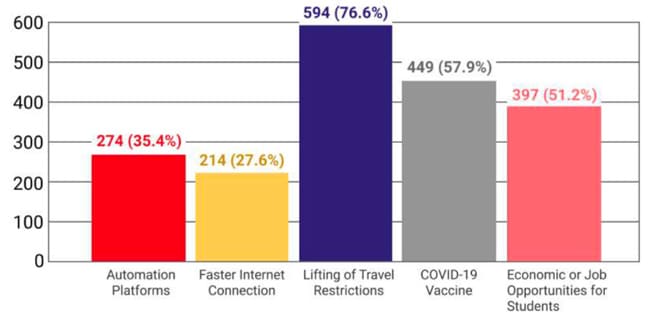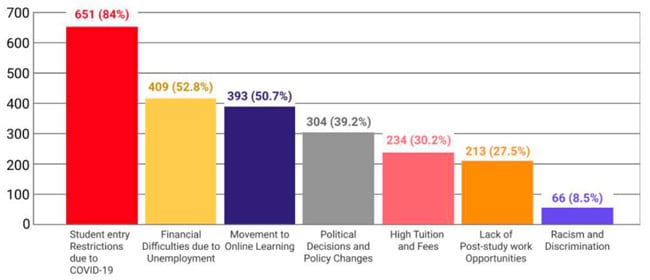International survey of education agents reveals optimism for 2021
- A 19-country survey of education agents shows that two-thirds used a combination of online and in-person counselling with students in 2020, while 35% worked only online with students
- Most agents feel their online recruitment activities have been successful
- The overwhelming majority feel positive about the next 12 months but there is also wide acknowledgement that various factors could make recruiting difficult
A new survey report from international education provider M Square Media (MSM), Online Recruitment: Agent Toolkit, Challenges, and Gaps to Fill, shows that agents are recruiting students online – either exclusively or along with in-person counselling – and that they feel optimistic about the recruitment outlook for 2021. The report also reveals that agents’ optimism is based in large part on a hope that travel restrictions will ease up for international students due to factors such as the availability of COVID vaccines.
The survey was conducted online beginning in October 2020 among 775 agents in 19 countries in regions including Africa (Nigeria and Senegal), Asia (Bangladesh, Indonesia, India, Malaysia, Nepal, Pakistan, South Korea, and Vietnam), Australasia (Australia and New Zealand), Europe (Cyprus, Turkey, and UK), North America (Canada, Mexico, and US), and South America (Colombia).
Recruitment went online in 2020
Last year, 35% of agents said they recruited students completely online, while 65% used both online and in-person methods.
Agents who recruited solely online mentioned the following as some of the reasons for this decision: offices being closed due the pandemic, wanting to keep staff and students safe, conducting PTE/IELTS classes online, counselling through Zoom, and the fact that everyone is living online during the pandemic so it’s the best way to reach students.
The 65% of agents using a combination of online and in-person methods said they were still recruiting in-person for a number of reasons. Some mentioned that Internet connectivity can be an issue, while others explained that some students like to first learn about a school online and then follow up with the agent in person. One agent said that, “Most of the student’s enquiry is resolved online but for IELTS coaching, they prefer offline.” In general, agents’ comments suggested that they tried to get as much done as possible online but that there was still a role for offline to nudge the student closer to applying or enrolling.
Email led the way in terms of the tools used to reach students (92%), followed by phone calls (89%) and social media (80%). Mailed marketing materials trailed significantly as a communications method (40%).
During the pandemic, MSM notes that agents have found webinars hosted by higher education institutions (HEIs) to be essential to their ability to promote a country and university/college to their students.
Importantly, more than a third of agents said that a major challenge for them in recruiting was limited or no online marketing materials provided by the institution.

Other challenges that agents are facing in providing student support are illustrated in the chart below. It’s clear that many agents are struggling to help students prepare for tests required for university admission during the pandemic.

Six in ten report successful recruitment
When asked if they feel successful in their online recruitment, the majority of agents said they do feel successful (44% “somewhat” and 19% “highly”). Less than 5% said they believe their online efforts have been unsuccessful.
86% are optimistic
Fully 63% of agents are “highly” optimistic about what the next 12 months will be like for their recruitment activities, with a further 23% “somewhat” optimistic. As the chart below shows, agents’ optimism is due in large part to having faith that there will be lifted travel restrictions (77%) and that COVID vaccines will ease the pandemic (58%). Significant proportions also expect improved online capabilities in the form of automation platforms (35%) and faster Internet (28%).

Of course, much is still unknown about how 2021 will proceed, and agents are worried about the potential for a number of factors to make their work and student mobility more difficult. Chief among their worries is that border restrictions will continue to make it difficult for students to travel to study (84%), as shown in this chart:

As MSM notes, successful online recruitment is well within reach for those agents with sufficient technological know-how and resources, but even then, the year before us remains very unpredictable and agents did not shy away from this fact in their responses.
Government policies key
By far the greatest number of agents said they had sent students to Canadian HEIs (62%). In second place was the UK (22%), followed by Australia (8%) and the US (2%). Another 6% sent students to other countries.
MSM points to Canada’s policies aimed at helping international students as a main reason the country become even more popular during the COVID pandemic, from adjusting study permits to allow students to begin studies online to increasing flexibility for post-graduation work permits to allowing international students to enter Canada to study as of October 2020.
The UK also had a relatively strong showing in 2020, with record numbers of non-EU/EEA students enrolling in HEIs in that country. MSM cites the strong post-study work and immigration routes available in the UK as a significant that reason international students have renewed their enthusiasm for studying there.
The US fared relatively poorly in 2020 in terms of its attractiveness as a study abroad destination because of factors including the Trump administration’s policies and anti-immigrant rhetoric and the rampant spread of COVID across the country. But MSM predicts a rebound soon due to the Biden administration’s commitment to global cooperation and to getting millions of Americans vaccinated – factors that should cause demand to pick up for the many incredible HEIs and programmes in the US.
For more information, please see:
















